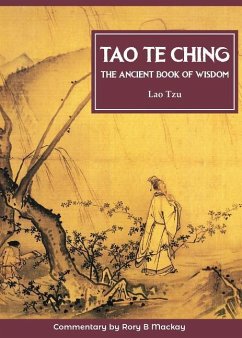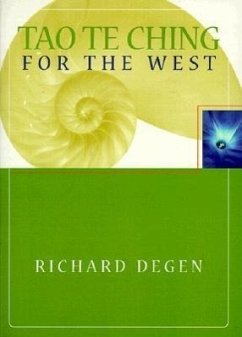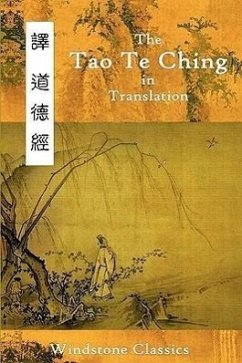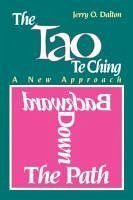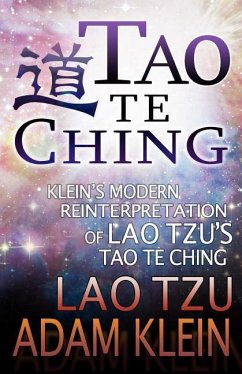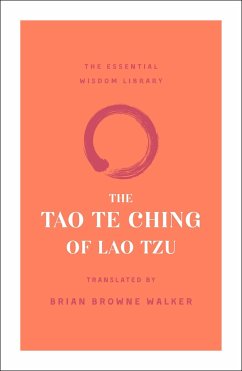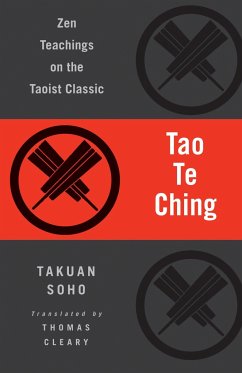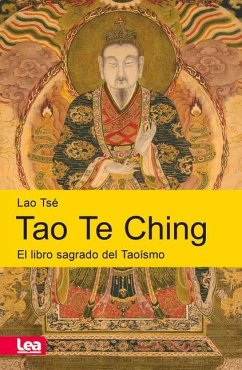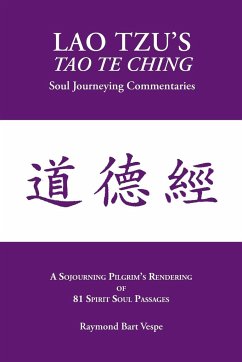
A Sufi Commentary on the Tao Te Ching
The Way and Its Virtue
Herausgeber: Casewit, Jane / Übersetzer: Faghfoory, Mohammad; Izutsu, Toshihiko
Versandkostenfrei!
Versandfertig in über 4 Wochen
25,99 €
inkl. MwSt.

PAYBACK Punkte
13 °P sammeln!
In 1974, the oldest extant copy of Lao Tzu's Tao Te Ching (6-4th century BCE) was unearthed at Xi' an along with the ceramic warriors guarding the tomb of the first Chinese Emperor Qin Shi Huang. By 1979, Professor Toshihiko Izutsu-- the Japanese Islamicist, philosopher and linguist-- collaborated in Tehran with Seyyed Hossein Nasr to translate this treasure into English. Dr. Nasr went on to put it into Persian adding a Sufi commentary which was recently published in Iran. This has now been translated into English with annotations by Mohammad H. Faghfoory. Imagine having a foundational world s...
In 1974, the oldest extant copy of Lao Tzu's Tao Te Ching (6-4th century BCE) was unearthed at Xi' an along with the ceramic warriors guarding the tomb of the first Chinese Emperor Qin Shi Huang. By 1979, Professor Toshihiko Izutsu-- the Japanese Islamicist, philosopher and linguist-- collaborated in Tehran with Seyyed Hossein Nasr to translate this treasure into English. Dr. Nasr went on to put it into Persian adding a Sufi commentary which was recently published in Iran. This has now been translated into English with annotations by Mohammad H. Faghfoory. Imagine having a foundational world scripture like the Tao Te Ching explained by such a renowned Sufi scholar and internationally recognized spiritual authority as Dr. Syed H. Nasr. Passages whose subtleties are normally inaccessible to the Western mind become clear. Through Dr. Nasr's insightful use of verses from such Persian luminaries as Rumi, Hafiz, and Attar, the reader is introduced to the " world" behind this world. The scholar recognized as the " Father of World Religions", Huston Smith, refers to the Tao Te Ching as a " Testament to humanity's at-home-ness in the universe, [which] can be read in half an hour or a lifetime... .The Tao is the Way of Ultimate Reality... the ordering principle behind all life... the integrating principle of the whole - The Spirit, as it were, of the universe - instinct without contrivance, which flows with purpose." It also refers to the Way of human life. The " Sage", or True Man, is the Noble primordial nature within each of us. The dignified sage within rests content in wu-wei, the inner tranquility with no attachment to the transient, always aware of the Eternal Nature of others. The exquisite explication of the qualities of this sage within, is one of the extraordinary offerings of this work. The Tao brings all things to completion. Three civilizations come to bear! Just as the original English translation of the Tao Te Ching presented here was the fruit of a collaboration between a Japanese and Persian scholar, and through Nasr's translation and commentary into Persian, this book becomes the scene of an encounter between Islamic and Chinese religions and civilizations as well as Persian culture where Qur' anic verses, verses of the Tao Te Ching and Persian Sufi poetry and prose stand side by side. " A Sufi Commentary on the Tao Te Ching, penned by the greatest living Muslim philosopher Seyyed Hossein Nasr, enshrines nothing less than a fulfilment of the Prophetic command to " Seek knowledge, even in China." We see in this work a first-rate exposition of traditional Chinese ontology, cosmology, and ethics through the lens of the commentator's lifelong engagement with Sufi metaphysical prose and poetry and the traditions of the Far East. This book can also help reorient Islam's dialogue with other religions, which is most often limited to hackneyed comparisons between Islam and Christianity. As Nasr shows so well, Taoism shares an unparalleled affinity with Islam, from its conception of nature to its understanding of Ultimate Reality. Most importantly, at a time when the world calls us in unprecedented fashion to the dissolution of our human nature, A Sufi Commentary on the Tao Te Ching invites us to rediscover ourselves through the aid of timeless wisdom. For, " When there is a storm outside, the sage goes inside and tends to his own garden." -- Mohammed Rustom, Professor of Islamic Thought and editor of A Sourcebook in Global Philosophy, Carleton University



